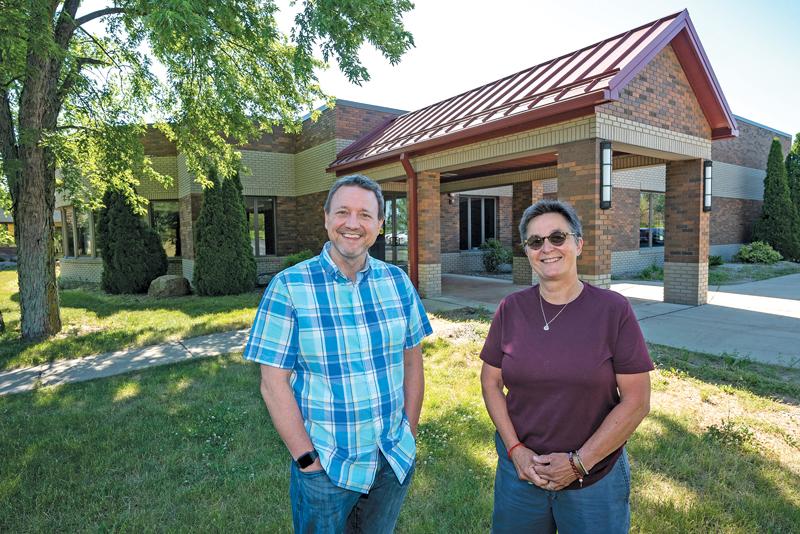In May, one gigantic dream started to come true: their nonprofit Hive Project signed a $2.3 million sales contract for the former Boysville school in Macon Township. Now they’re turning its seventeen buildings and 215 acres of rolling fields, ponds, and wetlands into a “campus of art, innovation, and sustainability” that brings together artists, educators, athletes, and entrepreneurs “to share, teach, innovate, and compassionately serve.”
The founders are partners in the Post Companies, a Dexter-based IT business. “Ninety percent of our clients are nonprofits–many art organizations, religious organizations, K-12 schools, food banks, ballet companies, and small businesses,” Goodell says. “We realized they all share common pain points and common needs, so we started discussing ways to help.”
Goodell and Tucker-Gray also share a love of music. Goodell is director of orchestras at Greenhills and director of music and technology at St. Clare’s Episcopal Church. Tucker-Gray is director of finance for St. Andrew’s Episcopal Church and a beekeeper–which explains the Hive’s many bee-themed names.
Ten years ago, they began thinking about creating an arts nonprofit along the lines of Interlochen or Blue Lake in northern Michigan. But as their circle of dreamers expanded, so did the vision. It took physical form when they found the Boysville campus.
Built as a research station by the first Henry Ford, the complex was expanded by the Holy Cross Brothers as a school for troubled boys. The school closed in 2015, leaving its historic and modern buildings in various stages of repair and restoration.
When Goodell and Tucker-Gray discovered it in 2019, they re-imagined the administration building as work-share offices–its high-speed internet and strong cell phone service were rare commodities in the rural area. They envisioned the former dormitory hosting retreats, workshops, summer campers, even year-round students. The historic Ford buildings and laboratories could be glass-blowing, welding, video, and sculpture studios.
The deal closed after eighteen months of negotiations, and many promotional tours with advisors, potential investors, and potential tenants. Two days later, the first tenants began moving into the administration building, which Goodell and Tucker-Gray renamed the Swarm. Within two weeks, the telecommuting offices were filling with businesspeople from as far away as Detroit, Ann Arbor, and Adrian.
Ford had hired local farmers to grow soybeans in the fields and used their crops to experiment with alternative materials for his cars, including soy-based body panels and paints. But the managers who succeeded him didn’t share his enthusiasm, and in 1948 sold the property to the Holy Cross Brothers. According to a 2014 article in the Tecumseh Herald, Boysville “was initially a boarding school for Catholic boys with home issues.” Over the years, it evidently took on a more custodial function: in 2010, the Ann Arbor News reported an alleged assault on a staff member and the “escape” of five residents.
“It would cost many millions of dollars for anyone to build the kind of infrastructure that is already in place here,” Goodell says. Ford had built two miles of underground tunnels linking the buildings and bringing heat produced by two enormous steam boilers. The brothers had a fiber optic internet connection brought in from Adrian.
The nonprofit will operate the complex’s water and wastewater systems, but interior renovations will be the responsibility of the groups that choose that space. Besides the Swarm, the first phase centers on the school’s sports complex–rechristened the Buzz Wellness Center–and dining facilities–now Royal Jelly Hall. Both should be ready this fall. Future plans include the Hatchery–a performing arts facility–and artist studios in the Hex, an early Ford building. The partners see that chapel transformed into Stinger Studio, for recording and podcasting. By next summer, Goodell says, the Honeycomb–the old high school–will be the epicenter of a “prestigious summer camp” for learners of all ages.
In time, the founders hope to have a “next-generation” senior care and living center that will partner with a national hospital network. “But that obviously won’t happen for some years,” Goodell says.
Tucker-Gray emphasizes that the nonprofit plans no major capital campaigns or debt. While the founders are hoping to obtain grants, “this is a 501(c)3, completely self-sustaining and cash-positive by next year.”
“We are optimists by nature,” Goodell adds. “We’re also realists … We are in this for the long haul.”

Congratulations on your new community. I pass the campus often on the way to my daughter’s house.
Congratulations on creating your dreaming and turning Boysville into the Hive, the Swarm, Buzz Wellness Center wth more to come.
I went to boysville in 1985 and was just wondering what was there today
I went to school at Boysville from September of 61 until June of 63. I’m glad to see it’s being put to good use.
I was in Boyville from around 73-75 back then Boyville was nothing like it was in the mid to late 80’s and on. I was a troubled Youth who couldn’t find My way in the City of Detroit so I was sentence to Boyville for petty crimes also I didn’t want to attend The Detroit public school system so I had to be took from My Parents and placed in a place that was so foreign to Me Boyville was bad with it’s Dark Secrets that only Us children who were there during those years, maybe I’ll tell that story another day. Doing My unwanted stay at Boyville We were forced to attend Boyville Catholic church services Boy did I hate going to those services, if We didn’t want to attend We got dealt with by Our Group & the staf. I was able to get released from Boyville only to be soon placed at at Green Oaks & W. J Maxy from 76-78 from these Boy detention centers to Michigan Reformatory (MR) then on to Jackson Michigan Prison. If anyone would like to hear My story just email Me at [email protected] or on Facebook at https://www.facebook.com/michael.thompsonel.